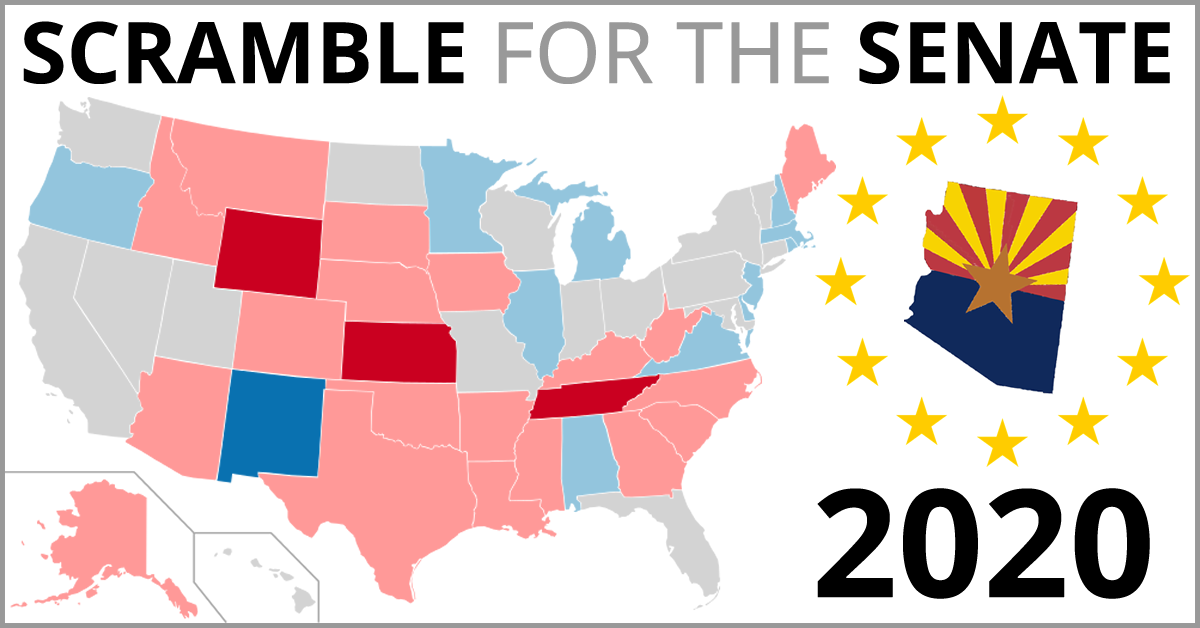Although the race for the White House is at the forefront of attention in the run-up to the general election in November, there is more at stake for the country than Donald Trump’s re-election. Elections for thirty-three seats in the U.S. Senate will be held on the same day, and the Democratic Party once again has a chance to retake control of the chamber since losing it to Mitch McConnell in 2014.
The importance of the upcoming elections was hinted at earlier this month by Mitch McConnell’s decision to reconvene the Senate, in spite of the fact that about half of the Senate is over sixty-five years old and Washington D.C. is still experiencing a steady uptick in coronavirus cases. The Republican leadership’s decision to drag senators back to the capital from across the country – mostly for the purpose of jamming through Trump judicial and executive nominees – shows that they are worried that the clock is ticking down on their time in power.
To wrest back control of the Senate, the Democrats need a net gain of either three or four seats, depending on who wins the presidency. The party’s path to victory is complicated, but polls have shown the party’s prospects improving over time.
If the Democrats want to win back the Senate, they will need a win the special election for Arizona’s junior Senate seat. That’s the race we’ll look at in today’s installment of Scramble for the Senate :: 2020.
This election in the Grand Canyon State is rated as a “tossup” by Cook Political Report, but if the Democrats don’t win there, they are unlikely to win elsewhere.
The incumbent Republican, Martha McSally, is a particularly weak candidate.
McSally was defeated in her run for Arizona’s other Senate seat in 2018, losing to Democrat Kyrsten Sinema. McSally was the first Republican to lose a Senate race in Arizona since the 1980s, and her defeat was widely blamed on a poorly-run campaign, in which she cozied up to Donald Trump despite his low approval rating in the state. Despite the embarrassing defeat, she was appointed to her current position by Governor Doug Ducey, to serve out the remainder of John McCain’s term.
In contrast to McSally’s weak position, her Democratic opponent is one of the strongest contenders in the entire country.
Mark Kelly is a newcomer to electoral politics, but has a great deal of experience in the political world thanks to his wife, former Congresswoman Gabby Giffords.

The couple rocketed to national fame in 2011 in tragic circumstances; an assassination attempt on the congresswoman killed six people and left her with brain damage. Giffords resigned from her position, but she and her husband stayed in the public spotlight thanks to their staunch support of gun responsibility.
In 2018, McSally tried to use her record as an Air Force veteran as a differentiator against her Democratic rival, to little effect. This time around, her military credentials will probably matter even less. McSally may have flown in the cockpit of a fighter jet, but Mark Kelly has piloted a Space Shuttle. As both a Navy pilot and an astronaut, Kelly has a storied career that he can reference constantly – to the extent that his campaign logo seems to be drawing inspiration from Starfleet.

Kelly is not just an impressive candidate with a resume that would make a political consultant drool; he has a formidable campaign machine. Kelly’s high profile before his Senate run and his tight relationship with the Democratic Party’s establishment ensured that his campaign would be flush with funds from the start.
Unlike most Democratic challengers, Kelly has been able to consistently out-raise the Republican incumbent, raising over $20 million last year.
This financial advantage may be one of the key factors in the race.
Many Democrats have found that the stay-at-home orders prompted by the coronavirus pandemic have made traditional campaigning activities difficult. Meanwhile, voters forced to stay at home are theoretically exposed to more advertising than ever through TV and online, which makes the Republican Party’s strength – having more corporate money to spend on political ads – more powerful.
In the case of Arizona, though, McSally is likely to be outspent by Kelly.
Besides, her 2018 campaign proved that she is not very effective at using campaign ads to her advantage. How much money you have matters, but what is ultimately more important is how you spend it.
While a lot can change in six months, especially in the era of COVID-19, right now, circumstances in the Grand Canyon State are looking good for the Democrats.
Arizona has been sliding away from the Republicans for a number of years and Mark Kelly’s candidacy seems to be accelerating that process. In the past month alone, polling shows Kelly’s lead over McSally increasing by 4%.
Diving into the details only makes the situation look worse for Republicans. Maricopa County (Arizona’s most populous county and a former Republican stronghold) has seen Kelly’s lead increase from 5% to 18% over the past year. Meanwhile, on the statewide level, independents break for Kelly by a two to one margin.
If Mark Kelly wins, he is unlikely to be a notable progressive voice in the Senate. His campaign platform largely reflects the incrementalism that the Democratic Party’s establishment prefers, but there are good reasons for progressives to be excited about his campaign. Victory in Arizona – a border state that Trump narrowly won in 2016– would be a landmark rejection of Trump’s racist, anti-immigrant agenda.
Furthermore, Kelly is a powerful advocate of gun responsibility with a compelling personal story to back his advocacy. He could do a whole lot of good for the country if Arizonans elect him to the United States Senate.

